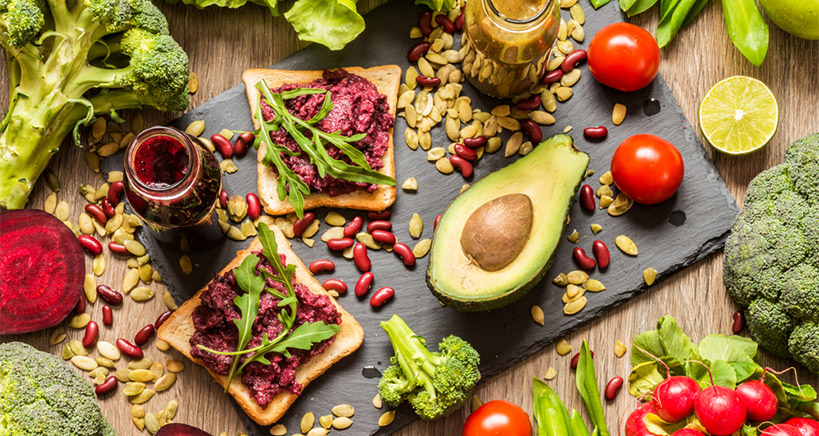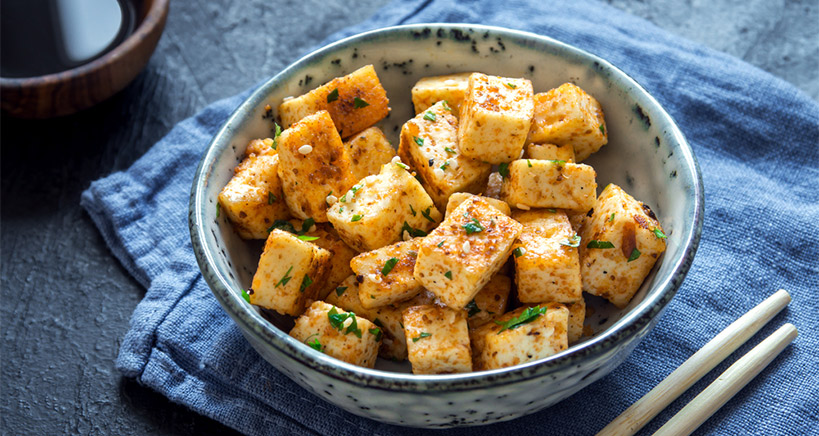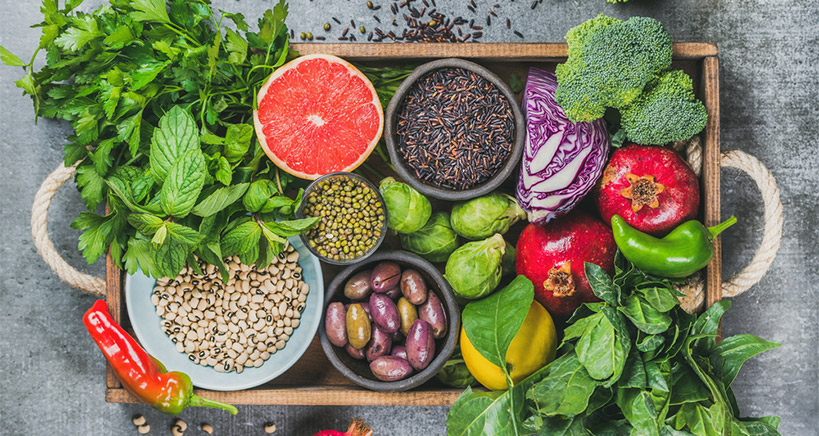
Keep Vegan Guests in Mind
As a caterer, you’ve probably found yourself having to prepare food for all types of clients, including vegetarians, glucose- and lactose-intolerant customers, those with nut allergies, and clients who adhere to sugar-free or low-fat diets. Veganism is just one more fad in a long line of trends for which you must bend over backwards to please your customers. Special requests are part of the business, and to make it in the dog-eat-dog catering arena you need to be flexible and know how to accede – with grace and generosity – to a range of requirements (even those that lead to extra work). However, when you do go that extra mile, it’s worth it, as your reputation as an accommodating and professional caterer will precede you.
What is Veganism?
Veganism isn’t a new concept, but it has been receiving more and more attention lately. The term “vegan” was coined in 1944 by a group of vegetarians who then formed the Vegan Society. In addition to not eating meat (like vegetarians), vegans choose not to consume dairy, eggs or any other products of animal origin. According to the Vegan Society website, “Veganism is a way of living which seeks to exclude, as far as is possible and practicable, all forms of exploitation of, and cruelty to, animals for food, clothing, or any other purpose.” The term vegan was created by combining the first and last letters of the word vegetarian.
Why Choose Veganism?
There are multiple reasons why vegans choose to avoid consuming animal products, including ethical sensibilities and health concerns. Ethically, vegans believe that all creatures have the right to life and freedom, and they are against ending or hampering a life just to consume an animal’s meat, eat its eggs, drink its milk, or wear its skin. Veganism, based on ethical considerations, opposes the psychological and physical stress that animals may endure, such as the cages they must live in, or the force-feeding of ducks and geese.
Those who embrace veganism for health reasons believe that a plant-based diet can reduce the risk of diabetes, cancer, and heart disease, and that it can help to reduce body fat and weight. There are also those who adapt a vegan way of life because of the environmental impact of animal agriculture, which contributes to more than 60% of the total amount of nitrous oxide emissions, about 40% of global methane emissions, and almost 10% of global carbon dioxide emissions. These three types of emissions comprise the major greenhouse gasses involved in today’s dual blight: air pollution and climate change.

Different Types of Veganism
The most common type of vegan is the dietary vegan, also known as the plant-based eater. These are people who avoid animal by-products in their diet but continue to use them in other products, such as clothing and cosmetics. Then there are raw-food vegans, who eat raw fruits, vegetables, nuts and seeds, in addition to foods cooked at temperatures below 118°F.
Dietary vegans avoid all food derived from animals, including meat, poultry, fish and shellfish, eggs, dairy products, and honey. (Honey is a problem for vegans because the harvesting of honey exploits the bees, and the selective breeding of bees, which is done to increase productivity, causes harm to the species.) Instead, vegans rely heavily on beans and legumes, pasta, tofu, nuts. seeds, fruit, and, of course, vegetables.
Catering for Vegans
When you agree to cater a meal that is at least partially vegan-friendly, you’ll be joining a group of caterers that is growing all the time. Surf the Internet and you’ll find links to dozens of catering companies that are happy to go out of their way to accommodate vegans and prepare foods that they can eat. The trick to catering for vegan clients and their guests is that the dishes that you prepare should look as attractive, and be as delicious as, their non-vegan counterparts. Your menu should be diverse and creative; you can’t just offer an array of salads and call it a day. You also have to ensure that the food preparation and cooking process are vegan-friendly. For example, you can’t cook vegetables and meats in the same pot, and you must be vigilant about using vegetable oils instead of butter for cooking.
Creating a vegetarian or vegan dish is all about making substitutions, and not simply about eliminating ingredients that vegans shun. Plenty of plant-based proteins are easy to include in menu offerings, and they will give your vegetarian and vegan guests the same satisfying experience enjoyed by meat-eating guests. On her website, Julia Spangler, a sustainable-events consultant, focuses on ways to prepare vegan-friendly food that is also interesting and original. She suggests using beans and legumes to replace meat in salads, wraps, burgers, and tacos. She also explains how caterers can use processed vegan proteins, such as tempeh, seitan, and tofu, as a flavorful source of texture and protein, or as an easy substitute for meat. Spangler recommends that if you are already preparing a vegan dish, you should also make it gluten-free and allergen-free, to accommodate all of the most common dietary restrictions in one shot.
To assist in the preparation of your vegan menu offerings, the Vegetarian Resource Group has compiled a handy table that explains the protein content of a variety of vegan foods that can be used as substitutes.

Time for Dessert
Thankfully, there is one thing you can definitely give your vegan customers that will impress and satisfy everyone at your catered event: dessert. Ice cream, cakes, pies, and cookies are all achievable and delicious, despite the lack of traditional ingredients. Eggs, butter, and cream aren’t needed to make cakes rich and creamy; all you need is some ingenuity and a few great recipes that will wow the crowd and establish your reputation as an outstanding vegan-dessert caterer.
In an article entitled, “The Best Vegan Dessert Recipes Even Non-Vegans Will Love,” the Huffington Post offers a great variety of dessert recipes, including this one for cheesecake that your guests will devour:
Ingredients
Filling
- 1 cup raw cashews
- 1 cup coconut cream
- 8 ounces vegan cream cheese, like Toffuti
- 1 Tbsp cornstarch
- 1 tsp pure vanilla extract
- 2/3 cup maple syrup
- 1 Tbsp melted coconut oil
- 2 tsp lemon zest
- 1-2 Tbsp lemon juice
- 1/8 tsp salt
Crust
- 3/4 cup rolled oats
- 3/4 cup raw almonds
- 1/4 tsp salt
- 2 Tbsp sugar
- 4 Tbsp coconut oil, melted
Instructions
- Put raw cashews in a bowl and cover with boiling hot water. Let rest for 1 hour (uncovered), and drain.
- Preheat oven to 350 degrees F and line a loaf pan or an 8×8-inch baking dish with parchment paper. Set aside.
- In a blender or food processor, mix together the oats, almonds, salt, and sugar until fine. Add the melted coconut oil, and process on low until loose dough is formed, scraping down sides as needed. If too dry, add a bit more melted coconut oil.
- Transfer mixture to parchment-lined loaf pan and spread evenly on bottom and a little up the sides.
- Bake for 15 minutes, then increase heat to 375 F and bake 5-10 minutes more, or until the edges are golden brown and there is some browning on the surface. Remove from oven and reduce heat to 325 degrees F.
- Put the soaked and drained cashews in a food processor or blender with coconut cream, vegan cream cheese, cornstarch, vanilla, maple syrup, coconut oil, lemon zest, lemon juice, and salt. Blend on high until very creamy and smooth, scraping down sides as needed. Taste and adjust flavor as needed, adding more lemon juice, lemon zest, or maple syrup, according to taste.
- Pour filling over the baked crust and spread into an even layer. Tap on counter to remove air bubbles.
- Bake for 50-60 minutes until the edges look slightly dry and the center is still slightly jiggly.
- Let rest for 10 minutes at room temperature, then transfer to refrigerator to let cool completely (uncovered). Once cooled, cover and refrigerate for at least 6 hours or overnight.
- To serve, lift out of pan with parchment paper and cut into bars or squares.

Vegan Catering: Challenging and Satisfying
The vegan trend is on the upswing and it’s causing caterers to think creatively about what they could do to appeal to a broader base of customers. More and more people are trying different ways to eat healthier, and most people are more conscious about their food choices. As a caterer, you should be thinking about how to attract all types of customers. Catering to vegans is one way to broaden your appeal, widen your customer base, and boost your business over the long haul.
Nice Blog!
Thanks for sharing an informative blog with us.It was a good read.